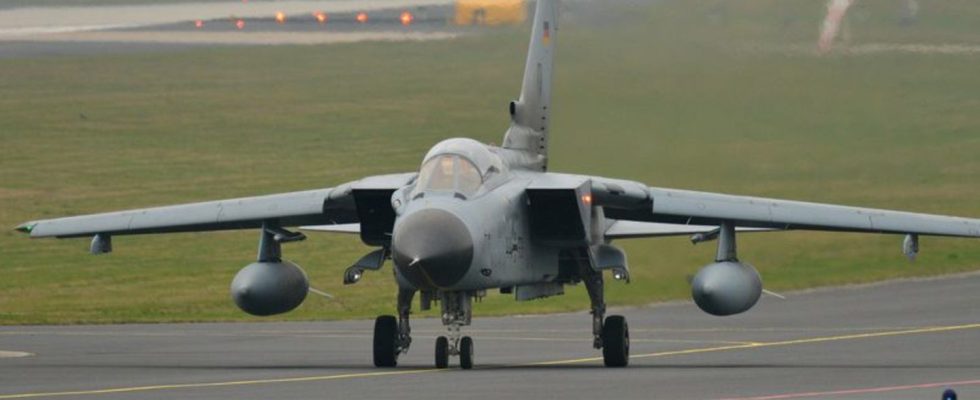defense
Excitement about EU atomic bomb: Is it all just a ghost debate?
A Bundeswehr Tornado aircraft at the Büchel air base in the Eifel. Around 20 B61 thermonuclear gravity bombs belonging to the US armed forces are said to be stored there – never officially confirmed. photo
© Harald Tittel/dpa
Some consider it a dangerous intellectual debate, others find the discussion absolutely necessary: Does Europe need its own nuclear protection against Putin’s nuclear missiles?
Donald Trump does not have a political office, nor is it certain that he will run for one again soon. And yet he managed to do it all with just a few words To put NATO in a state of excitement.
From the German Chancellor to the NATO Secretary General, top European politicians react with disgust and indignation to his threat to hand over defaulting payers among NATO partners to the Russian war machine in case of doubt. Others see this as more of a wake-up call and make suggestions about what should be done now to prepare for a possible Trump victory in the US presidential election on November 5th.
Nuclear deterrence has emerged as the top topic of the debate. Do the European NATO states need their own nuclear protective shield against potential attacks by the neighboring nuclear power Russia? Some consider this to be a ghost debate, others think the discussion is absolutely necessary.
Which NATO countries have nuclear weapons?
Of the nine countries that have nuclear weapons, three are in NATO: the USA, France and Great Britain. However, the nuclear arsenals of these three countries are filled very differently. According to the peace research institute Sipri, the USA possesses a good 5,200 of the world’s 12,500 nuclear weapons. Great Britain (225) and France (290) together account for just a tenth of that. According to Sipri, Russia even has slightly more nuclear weapons than the USA, namely almost 5,900.
How has NATO’s nuclear deterrent worked so far?
The core of the deterrence system are the US nuclear weapons stationed in Europe, in whose use countries such as Germany could also be involved through the concept of “nuclear sharing”. Another component are the nuclear weapons that the European NATO states Great Britain and France have at their disposal.
How exactly is Germany involved?
The Bundeswehr maintains combat aircraft so that it can use US nuclear bombs in an emergency. In Büchel in the Eifel – it has never been officially confirmed – around 20 thermonuclear B61 gravity bombs of the US armed forces are stored. So far they can be linked under German tornadoes. However, it was decided to procure state-of-the-art F-35 stealth jets for the task in order to keep the Air Force operational in the future. Military experts point out that with the ability to deploy, Germany also has access to NATO’s nuclear planning.
Why doesn’t Germany have its own nuclear weapons?
The Paris Treaties, signed in 1954, regulated the relationship between the Federal Republic of Germany and the three Western powers: the USA, Great Britain and France. At that time, West Germany refrained from producing nuclear weapons, but Chancellor Konrad Adenauer wanted to keep a nuclear option open for the Federal Republic, write researchers at the Center for Military History in Potsdam. They refer to a statement Adenauer made in 1957 in which he described tactical nuclear weapons as a “further development of artillery” that was indispensable. The renunciation of nuclear, biological and chemical weapons, which is effective under international law, was then confirmed in 1990 when Germany was unified.
How does France want to change nuclear deterrence?
French President Emmanuel Macron has long called for Europe to become more independent of the superpower USA and has repeatedly offered Germany and other EU partners talks on nuclear deterrence in the EU. The question could be whether there could be a stronger European dimension of nuclear deterrence. However, critics accuse France of only looking for money to modernize its nuclear arsenal – especially since France is making it clear behind the scenes that communalization of control over its nuclear weapons is out of the question.
What could a European nuclear deterrent actually look like?
There is currently no clear answer to this question. Theoretically, France could publicly guarantee that it would be prepared to use its nuclear weapons to protect European interests. In principle, there is also an obligation to provide assistance in the EU Treaty. Article 42.7 states: “In the event of an armed attack on the territory of a Member State, the other Member States owe it all assistance and assistance in their power.”
What does the federal government think of the French offer to talk?
She is divided. Finance Minister Christian Lindner (FDP) commented positively on Macron’s initiative in a guest article for the “FAZ” and believes that we need to talk about it. Defense Minister Boris Pistorius (SPD), on the other hand, said when asked whether the federal government would have to react to Macron’s offers: “No, we don’t have to.” In his view, the American protective shield must be maintained and not given up or questioned carelessly.
Federal Chancellor Olaf Scholz (SPD) also sees it this way. “I don’t know what this discussion is about today,” he told “Zeit” about the ideas about a European nuclear umbrella. Pistorius even considers the discussion to be dangerous. “The last thing we need right now is the nuclear debate. This is an escalation in the discussion that we don’t need.”

